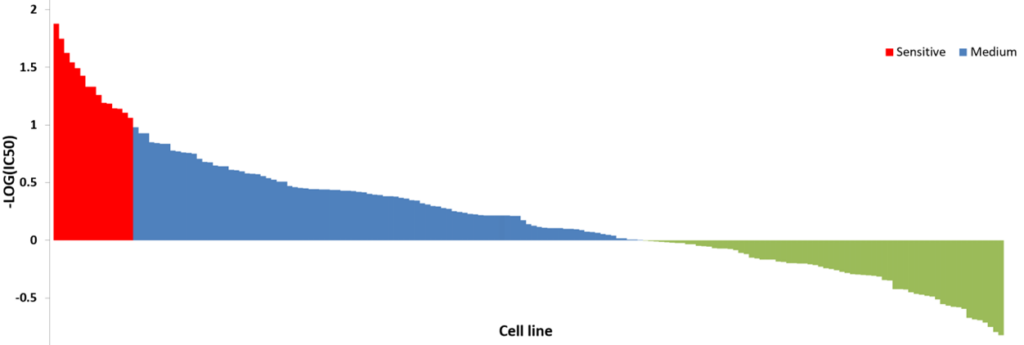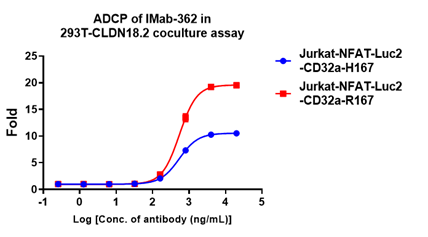Unleash Drug Discovery Power with Kyinno's MegaScreen Cell Panel Screening
In Vitro Services
Introduction to Kyinno’s MegaScreen
At the forefront of drug discovery and biomarker development, our MegaScreen Cell Panel Screening Service offers a significant advantage with over 700 sequenced and certified human cancer cell lines. This extensive collection is among the largest available and ensures unparalleled reliability for our clients. Each cell line has undergone rigorous sequencing to verify its authenticity, providing researchers with dependable and diverse models for advanced therapeutic investigations. This powerful resource empowers pharmaceutical and scientific endeavors to uncover novel drug targets and elucidate disease pathways more efficiently.
What is Cell Panel Screening?
Cell panel screening in preclinical drug development tests compounds across a wide array of genetically diverse cell lines, enhancing stages like hit identification and lead optimization. This method allows for a nuanced assessment of drug responses, aiding in the early detection of potential resistance mechanisms and refining therapeutic targets, thereby streamlining the lead optimization process.
Using Cell Panel Screening in Drug Discovery
Cell panel screening is optimally utilized during the Hit Identification stage of drug discovery. Leveraging our collection of over 700 authenticated human cancer cell lines, this method allows for rapid screening of compounds across diverse genetic profiles, enhancing both efficiency and the potential for discovering viable drug candidates.
Key Advantages of Cell Panel Screening in Hit Identification:
- Efficiency: High-throughput screening across a diverse set of cell lines accelerates the discovery process.
- Efficacy Insights: Extensive genetic diversity offers valuable insights into compound efficacy, aiding in the selection of promising leads.
- Toxicity and Safety: Early detection of toxicity and off-target effects helps refine compound choices, reducing risks and costs in later stages.
Utilizing this broad spectrum of cell panels streamlines drug development by focusing efforts on the most promising therapeutic potentials, optimizing outcomes from early discovery through preclinical validation.
| Drug Discovery Stage | Alternative Methods | Benefits of Cell Panel Screening |
| Target Identification | Genomic Techniques, Proteomics, CRISPR-Cas9 | While offering some benefits, cell panel screening is typically not utilized at this early stage of drug discovery. |
| Hit Identification | High-throughput Screening, Molecular Docking | Explores efficacy across multiple cell types, enhancing hit discovery. |
| Hit to Lead | Structure-Based Drug Design, SAR Analysis | Assesses the impact of chemical modifications, refining leads more efficiently and comprehensively. |
| Lead Optimization | ADME Profiling, Animal Models | Offers extensive data on efficacy and toxicity, optimizing drug candidates. |
| Preclinical Validation | In Vivo Animal Testing, Organ-on-a-Chip | Supplements in vivo analysis with cost-effective data, evaluating efficacy and safety across genetic diversity. |
| Drug Discovery Stage | Target Identification |
| Alternative Methods | Genomic Techniques, Proteomics, CRISPR-Cas9 |
| Benefits of Cell Panel Screening | While offering some benefits, cell panel screening is typically not utilized at this early stage of drug discovery. |
|
|
|
| Drug Discovery Stage | Hit Identification |
| Alternative Methods | High-throughput Screening, Molecular Docking |
| Benefits of Cell Panel Screening | Explores efficacy across multiple cell types, enhancing hit discovery. |
|
|
|
| Drug Discovery Stage | Hit to Lead |
| Alternative Methods | Structure-Based Drug Design, SAR Analysis |
| Benefits of Cell Panel Screening | Assesses the impact of chemical modifications, refining leads more efficiently and comprehensively. |
|
|
|
| Drug Discovery Stage | Lead Optimization |
| Alternative Methods | ADME Profiling, Animal Models |
| Benefits of Cell Panel Screening | Offers extensive data on efficacy and toxicity, optimizing drug candidates. |
|
|
|
| Drug Discovery Stage | Preclinical Validation |
| Alternative Methods | In Vivo Animal Testing, Organ-on-a-Chip |
| Benefits of Cell Panel Screening | Supplements in vivo analysis with cost-effective data, evaluating efficacy and safety across genetic diversity. |
|
|
|
Why Work with Us?
When selecting cell panel screening vendors, we advise to consider these essential factors:
- Genetic Diversity: Utilizing diverse genetic cell lines enhances the evaluation of drug impacts, which is critical for broad treatment efficacy. Our 700+ cell line panel is the market leader in terms of comprehensiveness and genetic diversity.
- Predictive Accuracy: High accuracy in screening predicts real human responses, reducing later-stage development risks. We have committed to authenticating every cell line to ensure the reliability of our analysis.
- Cost-Effectiveness: Optimize the balance between detailed data acquisition and resource expenditure. Our 700+ cell panel provides one of the most cost-effective solution on the market.
How to Get Started
Kindly submit a message on our contact us page or send an email to bd@kyinno.com to get started.
Example Data for Drug Discovery
Case Study: HRD High Score Cell Panel Screening
We calculated homologous recombination deficiency (HRD) score for our cell lines and selected hundreds of cell lines with high HRD scores for compound screening. In a 14-day compound treatment assay, we successfully tested 4 compounds within 4 weeks.
Frequently Asked Questions (FAQs):
Customer: Hi there, I’m interested in your cell panel screening services. Could you tell me more about the types of genetic verification you perform on your cell lines?
Agent: Hello, we appreciate your interest in our services. To ensure the authenticity of our cell lines, we utilize STR profiling and whole-genome sequencing to verify their genetic profiles and confirm they are free from contamination.
Customer: Could you tell me how I can customize the cell panels to fit my research focus?
Agent: Certainly. We offer the ability to tailor cell panels to specific diseases or genetic markers. Please provide us with your specific requirements, and we will arrange a cell panel that meets your research needs.
Customer: What kind of data analysis comes with your screening services?
Agent: Our screening services include a detailed analysis report covering efficacy, toxicity, and genetic interactions, along with interpretations to assist in understanding how these findings could impact your drug development efforts.
Customer: How do I place an order for screening services?
Agent: To place an order, please send us an email detailing your project specifications and the services you require. We will respond with a quotation and guide you through the next steps.
Customer: What’s the usual lead time for receiving results?
Agent: The lead time generally ranges from 4-6 weeks, depending on the complexity and scope of the project. We strive to deliver results efficiently while maintaining high quality.
Customer: How much do your screening services cost? Is there different pricing for larger projects?
Agent: Our pricing is based on the project complexity and scale. We offer a range of options to fit various budgets and project sizes. I would be happy to discuss your specific needs to provide a customized proposal.
Customer: Do we need to sign an NDA before we start a screening project?
Agent: It is standard practice to sign a Non-Disclosure Agreement to protect all parties’ confidential information. We can provide an NDA, or use one provided by your legal team.
Customer: Do these cell lines have multi-omic data?
Agent: Absolutely. We have transcriptomic (gene expression), gene mutation, and gene copy number data for nearly all cell lines, and proteomics data for the majority of them. All data are processed using state-of-the-art bioinformatics pipelines. For example, we use DeepMind’s AlphaMissense to assess the pathogenicity of missense mutations.
Customer: What is the timeline to complete a whole panel screen?
Agent: For a standard cell viability assay with a 4-6 day compound treatment, screening our entire panel of 700+ cell lines typically takes 10-14 weeks.
Customer: Is there a positive control for the screening?
Agent: Yes, we incorporate positive controls into every screening experiment to ensure data reliability.
Customer: Is there information about cell line doubling times?
Agent: We have completed the testing and obtained doubling time data for 238 cell lines and are actively expanding this dataset to cover the entire panel.
Customer: How many cancer types are covered in the panel?
Agent: Our panel represents a diverse range of human cancers, encompassing over 46 cancer types with at least 3 cell lines per type.
Customer: What is the duration of the compound treatment?
Agent: The compound treatment duration is flexible and can be customized based on your compound’s mechanism of action. Typical treatment times range from 3 to 14 days.
Customer: is there bioinformatic analysis of the MegaScreen data?
Agent: Yes, our strong bioinformatics team performs in-depth data analysis, comparing your compounds to over 2000 existing drugs. We utilize proprietary algorithms to identify both univariate and multivariate biomarkers, enabling the potential expansion of patient populations.
All In Vitro Services

The 2D Cell Proliferation Assay, a primary method for cell growth studies, focuses on tumor cells cultured in suspension or monolayers. It allows for comprehensive analysis, highlighting cell development dynamics.


Organoids, sophisticated 3D organ replicas grown in vitro, are vital in biomedical research, aiding disease modeling, drug testing, and understanding organ development. KYinno excels in cultivating organoids from diverse tumor tissues, collaborating closely with cancer hospitals to ensure translational relevance.

Internalization Assay evaluates cellular absorption rates of monoclonal antibodies, vital for advancing anti-cancer and anti-inflammatory therapies. This process is essential for developing anti-cancer and anti-inflammatory treatments and refining oncology and inflammation treatments.

An ELISA assay is an indispensable technique that stands out for its high sensitivity and specificity in antigen-antibody binding interactions. Its precision ensures it remains the preferred choice for many immune response studies.

A FACS Binding Assay or Fluorescence-Activated Cell Sorting is a pivotal cellular biology research technique for binding evaluation. It offers insights into cellular binding mechanisms, enriching our understanding of cell interactions.

Immuno-Oncology Assay is a core tool in tumor immunology, providing detailed information designed to analyze interactions between tumors and immune responses.This deep understanding accelerates advancements in tumor immunology research.

ADCC Assay measures antibody efficacy in biological research. A standard method for understanding antibody performance. It rigorously tests their functionality and efficacy, providing insights into antibody-mediated cell destruction processes.
